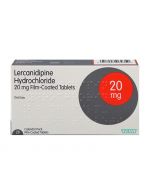Lisinopril
Buy Lisinopril tablets online for effective treatment of high blood pressure
Please note brand received may vary
sourced in the UK
order before 2pm
UK based pharmacies
-
What are Lisinopril tablets?
Lisinopril belongs to a class of drugs known as angiotensin-converting enzyme (ACE) inhibitors.
ACE inhibitors are used in the treatment and management of hypertension (high blood pressure), they also massively reduce the risk of heart failure, stroke and a number of cardiovascular conditions.
It is available in several doses such as 2.5mg, 5mg, 10mg and 20mg, although you must have a prescription to buy Lisinopril.
What is Lisinopril used to treat?
Lisinopril tablets are among the most common forms of high blood pressure treatments available in the UK. They are also a common prescription for people who are recovering from a heart attack; additionally, they are prescribed for heart failure and can prevent future heart attacks and strokes.
Why is Lisinopril recommended for high blood pressure?
Lisinopril has been found to be more effective or at least as effective as several other medications for high blood pressure.
Another benefit of Lisinopril is it delays the progression of renal disease in patients with diabetic kidney disease.
How do Lisinopril tablets treat high blood pressure?
Lisinopril works by inhibiting the Angiotensin-Converting Enzyme (ACE) which is responsible for producing natural hormones that help to control blood pressure.
This hormone can also cause blood vessels to restrict and become more narrow, as a result, blood pressure is increased due to the added resistance that the heart faces when pumping blood around the body.
By inhibiting Angiotensin-Converting Enzymes, the hormone responsible for narrowing blood vessels is suppressed. This allows blood vessels to widen and blood to flow throughout the body more freely. The pressure on the heart is also reduced due to the increased blood flow.
Who can take Lisinopril tablets?
This medicine can be taken by adults and children who are at least six years old.
Lisinopril is one of the most commonly prescribed medicines to treat high blood pressure, but it may not be suitable for everyone.
Ensure you tell your doctor if:
- You are on a low-salt diet
- You are currently pregnant, are trying to get pregnant or think you might be pregnant
- You are breastfeeding
- You have any blood problems
- You have had an allergic reaction to Lisinopril or any other medicine in the past
- You have unstable or a low blood pressure reading
- You have recently had diarrhoea or vomiting
- You have heart, liver or kidney problems
- You are going to have any surgery that requires a general anaesthetic
- You are due to undergo desensitisation treatment to lower your allergy to insect stings
- You have diabetes
If you have any concerns at all about taking this medicine for high blood pressure or any other conditions, you should speak to your doctor before you start to take it.
Can I buy Lisinopril Tablets Online?
Yes, you can buy Lisinopril online from most UK online pharmacies such as Medicine Direct. You will need to complete an online healthcare questionnaire so a qualified healthcare professional can assess your condition to ensure this treatment is best suited to your condition.
Can you buy Lisinopril tablets over the counter in the UK?
Lisinopril is not available to be purchased over the counter, it is a prescription-only medicine and needs to be prescribed by a doctor or prescriber. Lisinopril requires ongoing monitoring which is why it needs to be prescribed by a doctor.
Lisinopril Alternatives
If Lisinopril is not suitable for you to take, we stock a variety of other high blood pressure medicines.
You can buy one of the following medicines after you have had an online consultation with one of our prescribers:
-
Lisinopril Dosage and Directions
Our pharmacists and prescribers follow NICE guidelines when prescribing Lisinopril.
Always read the patient information leaflet thoroughly before taking high blood pressure tablets.
Do not take any dose other than how much your doctor instructs you to take.
Lisinopril is available in the following doses:
-
Lisinopril 2.5mg tablets
-
Lisinopril 5mg tablets
-
Lisinopril 10mg tablets
-
Lisinopril 20mg tablets
How to take Lisinopril tablets
Lisinopril tablets can be taken with or without food, this medicine does not upset the stomach.
You should always take Lisinopril with a glass of water to help with swallowing the tablet.
It is recommended to take Lisinopril tablets at a similar time every day.
Your doctor will usually instruct you to take Lisinopril tablets once a day. They may suggest taking Lisinopril before bed the first time you take it; a common side effect of this medicine is dizziness, so it is best if you lie down after taking it for the first time.
-
-
Lisinopril Side Effects
As is the case with all medicines, taking Lisinopril comes with the risk of certain adverse effects.
The side effects of this medicine are generally very mild, and most people will not experience any at all.
However, you should speak to your doctor or pharmacist if any of these symptoms concern you or don't go away:
- Blurred vision
- Headaches
- Diarrhoea or vomiting
- A dry, tickly cough that won't go away
- Feeling dizzy or lightheaded, particularly when you stand up
- Itching or a mild skin rash
Always read the patient information leaflet that accompanies your medication for information on side effects.
ACE inhibitor-induced cough
ACE Inhibitors have been known to cause a dry and consistent cough in patients. The cough usually develops within one week of starting treatment and can last for up to six months. The cough will tend to subside after 1 to 4 days of stopping treatment.
Long term side effects of Lisinopril
Lisinopril is a long term treatment, if you have been prescribed Lisinopril to treat high blood pressure, it is likely you will require this treatment for the rest of your life.
Lisinopril is not linked to any common long term side effects. However, with long term use of Lisinopril, your doctor will regularly monitor your kidney function via regular blood tests.
-
Lisinopril Warnings and Drug Interactions
Certain medicines may interfere with how effective Lisinopril is at treating high blood pressure and other conditions.
You should inform your doctor if you are already taking any of these:
- Steroid medicines
- Allopurinol
- Tablets to make you urinate more (diuretics)
- Any medicines that are used to treat heart failure, low blood pressure, asthma or allergies
- Anti-inflammatory medicines, such as ibuprofen
- Medicines to treat diabetes
- Lithium (for mental health problems)
- Racecadotril
- Medicines to damp down your immune system
- Medicines that can increase the level of potassium in your blood
- Any medicines that can lower your blood pressure, including antidepressants, nitrates or medicines for an enlarged prostate
- Procainamide
- Any other medicine to treat high blood pressure
You can find more information on drug interactions on the NICE website.
See the patient information leaflet for comprehensive warnings.
Pregnancy and breastfeeding
Lisinopril is not indicated for use during pregnancy and is only prescribed during breastfeeding if the benefits outweigh the risks. Always speak to your doctor or pharmacist before taking any medication if you are pregnant or breastfeeding.
See the BUMPS website for more information on taking Lisinopril while pregnant or breastfeeding.
-
Lisinopril Ingredients
The main active ingredient within this medicine is: Lisinopril dihydrate
For a full list of the inactive ingredients, please read the Summary of Product Characteristics.
-
How much does it cost to buy Lisinopril tablets online in the UK?
Dosage Quantity Price Lisinopril 2.5mg tablets 28 tablets £12.99 Lisinopril 5mg tablets 28 tablets £13.99 Lisinopril 10mg tablets 28 tablets £13.99 Lisinopril 20mg tablets 28 tablets £13.99 -
What is Lisinopril prescribed for?
Lisinopril is an ACE inhibitor used to treat high blood pressure by relaxing and widening the blood vessels. It also provides protection against suffering future heart attacks and strokes.How long does it take for Lisinopril to lower my blood pressure?
You should notice a reduction in your blood pressure 2 to 3 weeks after starting your treatment course.How long will I need to take Lisinopril?
It is likely that you will need to take Lisinopril for the rest of your life. Lisinopril is a long term treatment plan for high blood pressure.Is Lisinopril safe to take for a long time?
Lisinopril is intended for long term use, it works better when used as part of a long term treatment plan for high blood pressure. Your doctor will continue to monitor your blood pressure and kidneys throughout your treatment to ensure everything is working as it should. There are no long-lasting side effects of Lisinopril, it is considered to be a safe drug when used long term.Can I stop taking Lisinopril if my blood pressure has gone back to normal?
If you require medicine to lower your blood pressure, stopping your treatment is likely to cause it to rise again. You should not stop taking Lisinopril without speaking to your doctor first.Does Lisinopril cause a cough?
ACE inhibitors have been known to cause a dry and consistent cough in patients. The cough usually develops within one week of starting your treatment. In some cases, it can last up to 6 months.Is Lisinopril a blood thinner?
No, Lisinopril is not a blood thinner and instead lowers blood pressure by relaxing and widening the blood vessels.When should I take my tablets?
You can take Lisinopril at any time of day. However, for your first few doses, it is recommended to take them before bedtime as it can make you dizzy. Generally, you can take Lisinopril tablets at any time of day as long as you consistently take them at the same time every day.Can I drink alcohol while taking Lisinopril?
Yes, there are no harmful interactions between Lisinopril and alcohol. It is recommended to only consume alcohol in moderation when taking high blood pressure medicine.What is the price of Lisinopril in the UK?
Prices start from £12.99 for 28 tablets.
Updated on: 20/05/2021
This content has been clinically researched and written by Pharmacist Hussain Abdeh.
Hussain Abdeh
MPharm: 2211840
Pharmacist
How it works - get your medicine in 3 simple steps
- 1 Choose your treatment Select the treatment or medication you need and answer a few questions online regarding your condition.
- 2 Online consultation A UK based doctor registered with the GMC will review your questions and assess your suitability for the medication.
- 3 Receive your delivery If approved, your medication will be dispensed from a UK based pharmacy.











